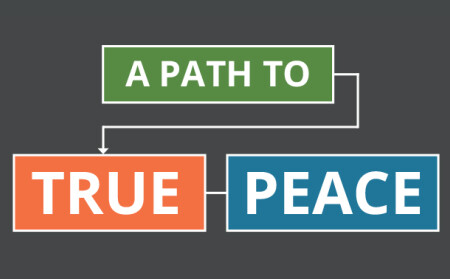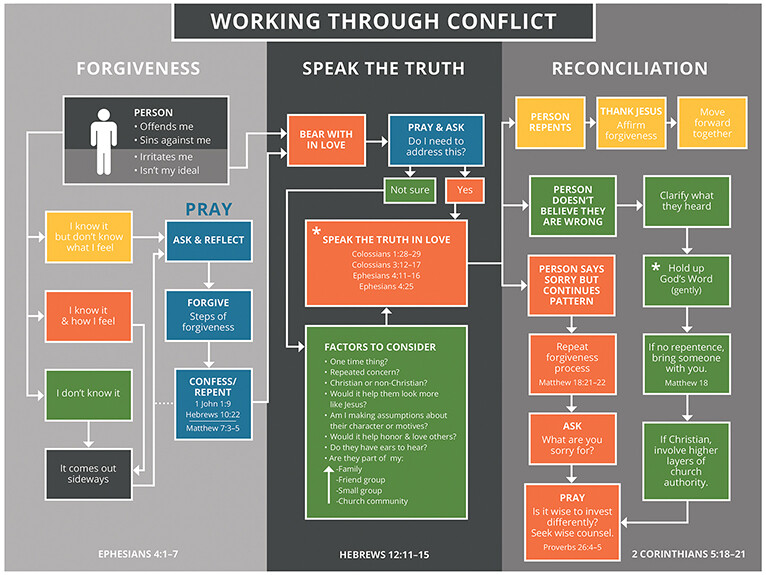Working Through Conflict, Part 1

You’re not alone if you’re feeling the sting from recent or even distant conflicts. Family dynamics, challenging personalities, past hurts or loss, stress and full calendars have a way of surfacing relational tension.
Have you found yourself longing for true peace with others, but end up settling for a false sense of neutrality just to avoid conflict or maintain control? Ephesians 4:3 tells us “…be eager to maintain the unity of the Spirit in the bond of peace.”
So, what is true Ephesians-style peace? And what does it mean to be "eager"? We'll get there, but first, let's examine some possible dynamics that may have historically made up your family's relationship with conflict.
Sweepers
You might come from a family of “sweepers”—people who sweep emotions and issues under a “rug” and pretend everything is okay or that time fixes things. Stuffing and ignoring things typically means merely coping in an unending search for comfort.
Stabbers
These are people who lash out in anger, accusation or back-stabbing gossip. Here you’ll find words or actions used to put others in their place or cause pain.
Judgers
These are people who assume motives, thinking they know all the answers and are most qualified to decide what happened and how someone should be punished. Prone to self-righteousness, they assume they know better. Judgers use the silent treatment or the “death glare.” They withhold forgiveness because it's clear to them that the person doesn’t deserve it.
As sweepers, stabbers or judgers, we minimize what Jesus has done, attempting to take the position He never intended for us to have. Only Jesus can remove sin and make things clean. Only God is holy and just enough to decide and enact the perfect discipline or punishment.
The book of Ephesians tells us that God is making His people one and that ultimately we'll live together in peace. Jesus is peace and He proclaims peace through the gospel. One of the applications of the gospel is how we treat each other. We’re called to live in peace with each other, but before we ask how to do that, let’s talk about what breaks that peace.
Somewhere near the top of the list is pride. Many of us swing from self-righteousness and self-reliance to self-pity. These forms of pride hurt relationships. It’s essential that we’re first honest about our own sin before a holy God because we all need His grace.
Conflict among broken people is inevitable, but what do we do when it happens? Go back to Ephesians 4:3. “Be eager to maintain the unity.” Eager means dealing with it, not letting it linger. It doesn't always mean an immediate conversation with the person, but it can very quickly be a conversation with God. That conversation can keep bitterness from anchoring in our hearts. Doing our part to live at peace means actively pursuing forgiveness even before a conversation is able to happen.
What if it was your actions or words that caused broken peace? Rush to repent before the Lord and then apologize. If someone hurt you, rush to begin the process of forgiveness. Keep the peace that Jesus purchased and the Spirit sustains. Don’t justify or minimize the sin. Deal with it. With the help of the Holy Spirit, resist the natural reaction to fear conflict or confrontation.
Consider if fear may be leading you to avoid someone or gossip about them. Perhaps you stuff your emotions, telling yourself it’s not that big of a deal. Or do you just keep your head down in shame? Instead, the Lord calls you to rush toward peace.
That doesn’t mean complete resolution always happens. Layers of forgiveness and apologies may be needed. That’s okay. We're called to move toward Jesus, continually seeking peace and forgiveness while asking Him for wisdom about what healthy changes may be needed in a relationship.
God’s children are called to walk in a manner worthy of the gospel, including humility, patience and bearing with each other in love. Be diligent to let God’s Spirit work in you when you realize a relationship is broken. Those who have been forgiven much are called to love much. How quickly we make things about our rights and desires. Unfortunately, instead of true peace, that can lead us to rush toward false forms of comfort and peace.

Conflict Flow Chart
The first column in the chart helps us see how forgiveness works in conflict. There are two sides to forgiveness: forgiving others and confessing and repenting of our own sin.
Forgiveness is something that a wounded person is called to grant, but there's a lot of confusion about this. Forgiveness is not contingent on whether or not someone else asks for it or deserves it. It doesn’t mean forgetting. And it’s not the same as reconciliation. Reconciliation requires both parties to humbly work toward true restoration. Not all conflict or forgiveness leads to reconciliation.
Once you’ve worked through the first section of boxes on the chart, you come to the blue boxes. That’s when it’s time to actively forgive. Not “let it go” or merely acknowledge the issue, but purposefully talk with God to work out the gospel in the situation.
One blue box is FORGIVE. You forgive another person.
- Come to God, your heavenly father, through Christ—under the direction of the Holy Spirit.
- Fully understand the wrong committed against you, including shame you feel/experience.
- Tell God the truth about what happened without excusing the wrong in any way. We don’t need to be judge and jury here.
- Tell God you forgive the person of the wrong done to you. This is like taking them off of the hook of your heart and placing them on God’s hook.
- Acknowledge that God will see that the debt owed you is paid in full. He sees that justice is done for you. It is not our place to get revenge or to inflict punishment.
- Thank your heavenly father for being a God of justice and love for you.
There is nothing tidy about this process. Some things are small, without big emotions linked to them. Some are really hard and happen in layers over seasons. While you may rush to talk with God and begin the forgiveness process, you may need time to completely forgive. The more you do this process, the more freely you live.
Another blue box is CONFESS/REPENT. It’s important to recognize when we've instigated sin, wounding and conflict, and when we've reacted to someone's sin with our own sin. Humility includes apologizing when we realize we are wrong—without excuses, minimizing or justifying our actions.
- Come to God, your heavenly father, through Christ—under the direction of the Holy Spirit.
- Fully understand the wrong you committed, including shame you feel/experience about it.
- Tell God the truth about what happened, confessing without excusing the wrong in any way.
- Ask God to forgive you of your sin. Tell Him you accept His forgiveness.
- Acknowledge that Jesus Christ paid the debt that you owe for this sin.
- Thank God for making a way for you to be forgiven and live free of the debt of this sin.
- Ask Jesus your Lord to help you follow Him in this area as you move forward together.
Are there any situations in which you need to go back and work through forgiveness or repentance? If you’re new to being specific about forgiveness, it can take practice. Take time to ask Jesus who you need to forgive or if you need to confess and repent.
Conflict is bound to happen in life. But you don’t have to just “deal with it.” Invite God to take you on a journey toward freedom as you are “eager to maintain the unity of the Spirit in the bond of peace.”
While I hope these tools help you navigate relationships with greater freedom, I recognize that you may have a more complicated situation that would benefit from additional prayer, conversation and wisdom. You're welcome to reach out to me to talk through your circumstances or to consider how Care Ministries or outside assistance could be helpful.
CONFLICT RESOURCES
- Download the Conflict Flow Chart.
- Read Working Through Conflict, Part 2.
- Download Practical Tips on Speaking the Truth in Love.
- Listen to part 1 of Andrea's message on conflict.

Andrea Tyson is Women's Ministries Director at New Hope Church. She loves to invest in women who are investing in others as we continue to develop a culture of walking toward Jesus and taking others with us.
